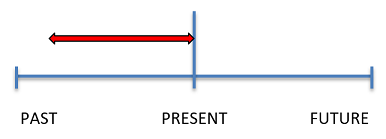Present perfect
Introduction
We use the present perfect to describe the past when it affects the present, for example- talking about past experiences
- for something that began in the past and is still true
- describing changes.

Examples:
- I have been to that restaurant twice.
- Emily has worked in the city for many years.
- Your hair has grown since last year.
Form 1 - Present perfect positive
To form the present perfect positive, we use"have" + past participle.
| Subject | "have" | past participle | |
|---|---|---|---|
|
I
You We They |
have
've |
been |
to India. |
| He / She / It |
has
's |
Past participles
With regular verbs, we form the past participle by adding "–d", "–ed" or "–ied" at the end, for example:
| regular verbs | ||
|---|---|---|
| infinitive | past participle | |
| receive | received | "-d" for regular verbs ending with "e" |
| work | worked | "-ed" for regular verbs ending with a consonant |
| study | studied | "-ied" for regular verbs ending with a consonant and "y" |
The past participles of irregular verbs are different and must be learnt, for example:
| irregular verbs | |
|---|---|
| infinitive | past participle |
| be | been |
| do | done |
| eat | eaten |
| find | found |
| go | gone |
| grow | grown |
| have | had |
| make | made |
| see | seen |
Practice
Complete the sentences with the present perfect positive form of the verb in brackets:.
Form 2 - Present perfect negative
To form the present perfect negative, we use"have not" + past participle.
| Subject | "have not" | past participle | |
|---|---|---|---|
|
I
You We They |
have not
haven't 've not |
eaten |
breakfast yet. |
| He / She / It |
has not
hasn't 's not |
Examples:
- I haven't been to Paris before.
- My order hasn't arrived yet.
- My parents haven't finished painting the house.
Practice
Complete the sentences with the present perfect negative form of the verb in brackets:.
Form 3 - Present perfect question
To form the present perfect question, we use"have" + subject + past participle.
| "have" | Subject | past participle | |
|---|---|---|---|
| Have |
I
you we they |
seen |
my purse? |
| Has | he / she / it |
Examples:
- Have you been to Italy before?
- Has it stopped raining?
- How long have you studied English?
Practice
Complete the sentences with the present perfect question form of the verb in brackets:.
Further practice
Complete the sentences with the correct answer from a, b, c or d:.
Further language point
We also use the present perfect positive form with "always" and "never".Using "never" makes the meaning negative:
| Subject | "have" | time period | past participle | |
|---|---|---|---|---|
|
I
You We They |
have |
always
never |
lived | in the city. |
|
He
She It |
has |
We also use the present perfect question form with "always" and "ever".
| "have" | Subject | time period | past participle | |
|---|---|---|---|---|
| Have |
I
you we they |
always
never |
lived | in the city. |
| Has |
he
she it |
Examples:
- Have you ever been to Mexico?
- Has she always lived in Paris?
Create a free Getting Started account
Related links
The following exercises include use of this grammar structure:
You might also be interested in:
- Business English vocabulary exercises
- Graphs and charts Pro account
- Listening Pro account
- Reading Pro account
- Scenario-based dictation exercises – business English Pro account
- Scenario-based dictation exercises – general English
You might also be interested in:
Beginner
- Past simple
- Past continuous
- Present simple
- Present continuous (present)
- Present perfect
- 'Going to' and 'will'
- Present continuous (future)
- Imperatives
- To be
- Pronouns: subject, object
- Pronouns: relative
- Adjectives and pronouns: possessive
- Adjectives and pronouns: demonstrative
- Basic adjective word order
- WH questions (interrogative pronouns)
- Articles: a, an, the
- Prepositions: time and place
- There is/ there are and quantifiers
- Conjunctions and, or, but
- Comparatives / superlatives (than)
- Zero conditional (if)
- First conditional (if)
- Modals: can/can't, could, will, shall
- Verb patterns
- Sequence adverbs
Intermediate
- Past perfect
- Past simple vs. present perfect
- Past simple vs. past continuous
- Present perfect continuous
- Future simple
- Future continuous
- Passive
- Indirect speech
- Used to/would
- Second conditional
- Third conditional
- Relative clauses
- Reflexive pronouns
- Modals: must, have to, should, should have
- Verb patterns: gerund or infinitive
- Adverbs of degree
- Adjective order
- Adjectives: ed or ing
Grammar
Quickly identify and focus on grammar issues:
- Grammar worksheets and test
- Scenario-based grammar exercises
- Grammar additional practice questions
- Verb conjugation practice
- Conditionals practice
Improve your grammar
Vocabulary
Vocabulary exercises:Expand your vocabulary using our three vocabulary trainers:Practice your spelling using our three spelling tests:Practice vocabulary relating to graphs and charts:
Learn vocabulary
Dictation exercises
Practice your listening skills and spelling using our dictation exercises:
- Scenario-based dictation exercises - general English
- Scenario-based dictation exercises - business English
- Dictation: focus on grammar
- Numbers
Complete dictation exercises
Video lessons
Focus on specific areas of business English using our video lessons:
Take a video lesson





